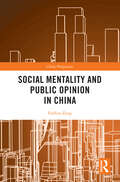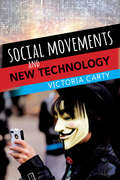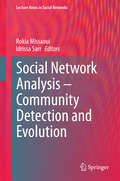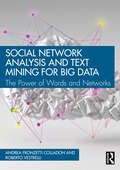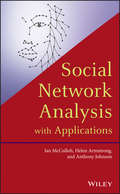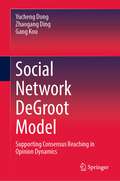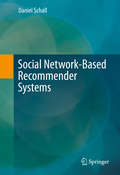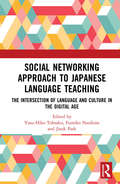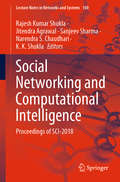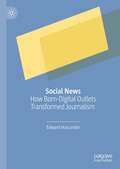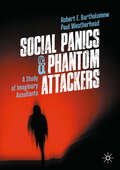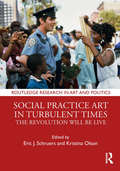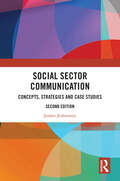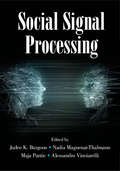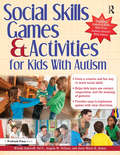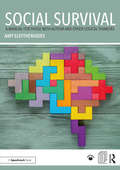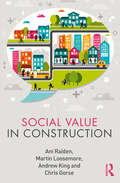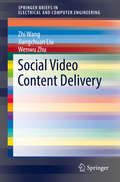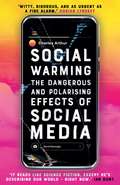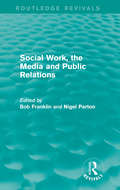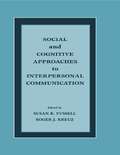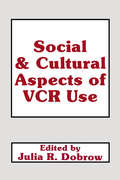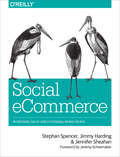- Table View
- List View
Social Mentality and Public Opinion in China (China Perspectives)
by Fanbin ZengThis book explores the relationship between social mentality, public opinion, media, and other factors through mixed methods in China, especially since the 21st century.The book deploys qualitative and quantitative research and adopts a multi-disciplinary perspective and diversified research methods. The studies are built on and contribute to the burgeoning literature seeking to anatomize the relationship between social mentality, media, and public opinion from the point of view of sociology and communication. It also aims to explore how media can be used to appease public opinion. As the first systematic study of the interconnection between social mentality and public opinion, this book provides empirical support and a theoretical framework for both areas. It will thus be a great read for students and scholars of communication, sociology, and social psychology, especially for those with a focus on China and new media.
Social Movements and New Technology
by Victoria CartyThe emergence of new information communication technologies-such as the Internet and social media networking sites and platforms-has strongly affected social movement activism. In this compelling and timely book, Victoria Carty examines these movements and their uses of digital technologies within the context of social movement theory and history. With an accessible and unique mix of theory and real-world examples, Social Movements and New Technology takes readers on a tour through MoveOn and Tea Party e-mail campaigns, the hacktavist tactics of Anonymous, global online protests against rapists and rape culture, and the tweets and Facebook pages that accompanied uprisings across the Arab world, Europe, and the United States. In each case study, the reader is invited to examine the movement, organization or protest and their use of digital tools through the lens of social movement theory. Discussion questions at the end of each chapter invite critical thinking and further reflection and debate.
Social Network Analysis - Community Detection and Evolution
by Rokia Missaoui Idrissa SarrThis book is devoted to recent progress in social network analysis with a high focus on community detection and evolution. The eleven chapters cover the identification of cohesive groups, core components and key players either in static or dynamic networks of different kinds and levels of heterogeneity. Other important topics in social network analysis such as influential detection and maximization, information propagation, user behavior analysis, as well as network modeling and visualization are also presented. Many studies are validated through real social networks such as Twitter. This edited work will appeal to researchers, practitioners and students interested in the latest developments of social network analysis.
Social Network Analysis and Text Mining for Big Data: The Power of Words and Networks
by Andrea Fronzetti Colladon Roberto VestrelliSocial Network Analysis and Text Mining for Big Data presents cutting-edge methods and tools that bridge the gap between text mining and social network analysis research while also providing new insights for analyzing (big) textual and network data. These tools are designed to cater to the needs of both business analysts and researchers to facilitate the creation of groundbreaking analytics.Beginning with clear definitions of social network analysis and text mining, this book benefits from a thoughtfully curated selection of methods and tools, drawn from the authors’ extensive research in the field. The focus then shifts to demonstrate how the interplay between words and networks can unlock the full potential of big data analytics. A centerpiece of the book is the Semantic Brand Score (SBS), a versatile and powerful metric for assessing brand importance through text analysis. All of the above is corroborated and illustrated with practical applications and case studies showing the value of these analytics in supporting change and improved managerial decisions. It also introduces a specialized software tool which enables users to perform the analyses detailed in the text.This book is a must-read for business leaders, marketing professionals, policymakers, researchers, and university students. It offers practical insights and actionable advice for achieving increased performance of companies and societal actions. The writing is tailored to make complex concepts accessible to both experienced researchers and readers who are new to the field.
Social Network Analysis with Applications
by Anthony Johnson Helen Armstrong Ian McCullohA comprehensive introduction to social network analysis that hones in on basic centrality measures, social links, subgroup analysis, data sources, and more Written by military, industry, and business professionals, this book introduces readers to social network analysis, the new and emerging topic that has recently become of significant use for industry, management, law enforcement, and military practitioners for identifying both vulnerabilities and opportunities in collaborative networked organizations. Focusing on models and methods for the analysis of organizational risk, Social Network Analysis with Applications provides easily accessible, yet comprehensive coverage of network basics, centrality measures, social link theory, subgroup analysis, relational algebra, data sources, and more. Examples of mathematical calculations and formulas for social network measures are also included. Along with practice problems and exercises, this easily accessible book covers: The basic concepts of networks, nodes, links, adjacency matrices, and graphs Mathematical calculations and exercises for centrality, the basic measures of degree, betweenness, closeness, and eigenvector centralities Graph-level measures, with a special focus on both the visual and numerical analysis of networks Matrix algebra, outlining basic concepts such as matrix addition, subtraction, multiplication, and transpose and inverse calculations in linear algebra that are useful for developing networks from relational data Meta-networks and relational algebra, social links, diffusion through networks, subgroup analysis, and more An excellent resource for practitioners in industry, management, law enforcement, and military intelligence who wish to learn and apply social network analysis to their respective fields, Social Network Analysis with Applications is also an ideal text for upper-level undergraduate and graduate level courses and workshops on the subject.
Social Network DeGroot Model: Supporting Consensus Reaching in Opinion Dynamics
by Gang Kou Yucheng Dong Zhaogang DingThis book investigates the DeGroot model in social network contexts, and proposes the social network DeGroot (SNDG) model. Specifically, this book focuses on two core research problems in the SNDG model: (i) Social network structures to reach a stable state (consensus, polarization, or fragmentation); and (ii) the convergence rate to reach a stable state. Furthermore, the authors generalize the SNDG model in an uncertain context, showing the effects of interval opinions on the SNDG model. In this book, the authors also discuss the applications of the SNDG model to support group decision making, including consensus reaching through adding minimum interactions, trust relationships manipulations, and risk control issues in the social network. Apart from theoretical analysis, detailed experimental simulations with real and random data will be applied to validate our research.This book is the first to connect opinion dynamics, social network and group decision making. The resultsreported can help us understand the evolution of public opinions in social network contexts and provide new tools to support consensus reaching in group decision making.
Social Network-Based Recommender Systems
by Daniel SchallThis book introduces novel techniques and algorithms necessary to support the formation of social networks. Concepts such as link prediction, graph patterns, recommendation systems based on user reputation, strategic partner selection, collaborative systems and network formation based on 'social brokers' are presented. Chapters cover a wide range of models and algorithms, including graph models and a personalized PageRank model. Extensive experiments and scenarios using real world datasets from GitHub, Facebook, Twitter, Google Plus and the European Union ICT research collaborations serve to enhance reader understanding of the material with clear applications. Each chapter concludes with an analysis and detailed summary. Social Network-Based Recommender Systems is designed as a reference for professionals and researchers working in social network analysis and companies working on recommender systems. Advanced-level students studying computer science, statistics or mathematics will also find this books useful as a secondary text.
Social Networking Approach to Japanese Language Teaching: The Intersection of Language and Culture in the Digital Age
by Yasu-Hiko TohsakuSocial Networking Approach to Japanese Language Teaching is a timely guide for Japanese language teachers and anyone interested in language pedagogy. The book outlines an innovative approach to language instruction which goes beyond the communicative approach and encourages a global view of language education and curriculum development through the use of social networking. It showcases diverse examples of how social networking can be harnessed and incorporated into everyday language classes to increase learners’ curiosity and engagement in real cultural and global interactions. While the focus is on Japanese language teaching, the concepts explored can be applied to other languages and teaching contexts. This book will benefit teachers of any language as well as linguists interested in language pedagogy.
Social Networking and Computational Intelligence: Proceedings of SCI-2018 (Lecture Notes in Networks and Systems #100)
by Narendra S. Chaudhari Rajesh Kumar Shukla Jitendra Agrawal Sanjeev Sharma K. K. ShuklaThis book presents a selection of revised and extended versions of the best papers from the First International Conference on Social Networking and Computational Intelligence (SCI-2018), held in Bhopal, India, from October 5 to 6, 2018. It discusses recent advances in scientific developments and applications in these areas.
Social News: How Born-Digital Outlets Transformed Journalism
by Edward HurcombeThis book is the first to define and describe ‘social news’, a new kind of journalism emerging in response to social media. Drawing on the author’s extensive research into news and social media platforms, Social News critically examines the rise of well-known outlets such as BuzzFeed and Mic in the US, and Junkee and Pedestrian in Australia. Hurcombe argues that these outlets became successful by strategically engaging with social media, producing sociable content personalised for millennials. Such outlets have been criticised for violating the rules of ‘quality’ journalism. However, this book shows how social news has provided a platform for marginalised voices and has been able to engage readers neglected by legacy news. While social media is frequently seen as a threat to the news industry, Social News shows that digital platforms have been driving new forms of journalism: ones that challenge our understanding of what journalism is, can be, and should be.
Social Panics & Phantom Attackers: A Study of Imaginary Assailants
by Robert E. Bartholomew Paul WeatherheadThis book provides an accessible overview of one particular type of social panic: that of the phantom attacker. Such panics are characterised by outbreaks of sensational claims of attacks by mysterious figures that seem to emerge from nowhere, attack their innocent human and animal victims, only to vanish without a trace. Taking the recent wave of needle-spiking reports in Europe as a starting point, this book does more than just catalogue such outbreaks historically and geographically. It also ties the phenomenon of phantom assailants to the moral panics literature. Meticulously investigating archival sources, the authors examine the social construction of social panics and unearth the parallels between contemporary episodes and historical antecedents in Europe, North America, Asia and Africa. Focusing on the sociohistorical and -cultural context, they uncover the role of mass media in creating and perpetuating these panics, which respond to anxieties pervading societies at particular points in history. Written in a lively style, this book is not only of interest for scholars and students of sociology, criminology, social psychology, media studies and history but also appeals to a lay audience interested in urban legends and true crime.
Social Photography: Make All Your Smartphone Photos One in a Billion
by Daniela BowkerHot photo apps come and go, but the practice of shooting and sharing is universal and is now a fundamental part of the way that we communicate with each other. Photos aren't printed on paper anymore - they are displayed on screens; and everywhere they are shown, the viewer is invited to like or share. Social Photography will show you how to create photos that will be clicked on, liked, shared, and - if you want - go viral. A must-read for anyone who takes their online presence seriously, this book will show you how to give your photos a fresh look, give you hundreds of posing and shooting ideas, and let you share your life's most exciting moments wider than ever before.
Social Practice Art in Turbulent Times: The Revolution Will Be Live (Routledge Research in Art and Politics)
by Eric J. Schruers Kristina OlsonThis volume is an anthology of current groundbreaking research on social practice art. Contributing scholars provide a variety of assessments of recent projects as well as earlier precedents, define approaches to art production, and provide crucial political context. The topics and art projects covered, many of which the authors have experienced firsthand, represent the work of innovative artists whose creative practice is utilized to engage audience members as active participants in effecting social and political change. Chapters are divided into four parts that cover history, specific examples, global perspectives, and critical analysis.
Social Sector Communication: Concepts, Strategies and Case Studies
by Jaishri JethwaneyCommunication, advocacy, and outreach are germane to the success of any organisation working in the social sector. This book provides a robust conceptual framework that is required to understand the demands of the sector and suggests strategies and tools for those engaged in social sector communication.This book not only highlights the theoretical underpinnings, practice, and skill of social sector communications in India but also provides an understanding of various skills and approaches required in communication including social marketing, media advocacy, social mobilisation, grassroots communication, and corporate social responsibility (CSR). With the aid of case studies, it offers suggestions on how to plan campaigns; write a concept note, field report, and press release, and effectively use social media to achieve developmental programme goals. This revised edition discusses the different perspectives of NGOs and programme implementers and helps in understanding the corporate–NGO interface vis-à-vis CSR projects.This book will be useful to students of social work, business, and management preparing for roles in social enterprises. It will also be of use to working professionals in the social sector.
Social Signal Processing
by Nadia Magnenat-Thalmann Judee K. Burgoon Alessandro Vinciarelli Maja Pantic"Social Signal Processing is the first book to cover all aspects of the modeling, automated detection, analysis, and synthesis of nonverbal behavior in human-human and human-machine interactions. Authoritative surveys address conceptual foundations, machine analysis and synthesis of social signal processing, and applications. Foundational topics include affect perception and interpersonal coordination in communication; later chapters cover technologies for automatic detection and understanding such as computational paralinguistics and facial expression analysis and for the generation of artificial social signals such as social robots and artificial agents. The final section covers a broad spectrum of applications based on social signal processing in healthcare, deception detection, and digital cities, including detection of developmental diseases and analysis of small groups. Each chapter offers a basic introduction to its topic, accessible to students and other newcomers, and then outlines challenges and future perspectives for the benefit of experienced researchers and practitioners in the field"--
Social Skills Games and Activities for Kids With Autism
by Wendy Ashcroft Angie Delloso Anne QuinnSocial Skills Games and Activities for Kids With Autism provides complete instructions for using fun, engaging games and activities to teach social skills to children with autism spectrum disorders. The games include directions for assessing skills such as asking for toys, getting the attention of others, reading nonverbal gestures, understanding perspectives, and cooperating to solve problems. Using the principles of Applied Behavior Analysis, the book takes teachers through motivating, prompting, shaping, modeling, and reinforcing social skills while playing the games and helping students learn to participate in other activities such as demonstrating the social skill in role plays and the natural environment. Perfect for teachers struggling to help their students with autism learn to interact socially with their peers, these games are sure to become a much-loved part of students' daily routines.
Social Survival: A Manual for those with Autism and Other Logical Thinkers
by Amy EleftheriadesSocial Survival is a practical manual outlining what it means to be a logical thinker and how logical thinkers can make sense of the social world. Relevant for young logical thinkers including those with high-functioning autism and Asperger’s syndrome, this book clearly outlines how social confusion might arise and how this can be overcome. Written in a clear and unpatronising style, the book considers a range of different social scenarios and breaks these down into manageable components with helpful activities to be completed by the young person. Chapters discuss the nature and benefits of logical thinking, nuances of language and communication in social situtations, and the intricacies of social etiquette and peer interaction. Features include: appealing visual resources; practical activities around social situations that are relevant to young people; blank templates which can be photocopied and are available for download online; guidance for family members on how to encourage ongoing communication; an action plan which can be personalised for different scenarios. Social Survival will be essential reading for health, social care and education professionals and parents working with those who have high functioning autism or Asperger’s syndrome or those who are logical thinkers who do not have a diagnosis. In addition, this book can be used independently by the young person themselves.
Social Value in Construction
by Andrew King Chris Gorse Martin Loosemore Ani RaidenWhile the concept of social value is not new, recent interest in social value in construction has grown because of new social procurement legislation around the world and an increasing acceptance of the need to ensure construction projects provide social value, rather than simply economic value. Despite this growing recognition, literature and professional guidance on the subject is hard to find. This is the first book looking at social value in construction and it sets the agenda by asking and answering important questions like: How is the construction industry developing and supporting social enterprise and social value and for who? How and when is the industry recording and measuring social value and its effect? Which organisations are doing things well and what can we learn from their experiences? What can industry players do together to consolidate efforts and drive improvements? What are the key challenges in the field and what does the future look like? Drawing on a variety of professional and academic experiences and disciplines, the authors present global perspectives and lay the foundations for creating social value in the construction industry. This timely book makes use of real-life case studies and examples of best practice to demonstrate how innovative companies can utilise contemporary research to create social value through their projects. It is time the construction industry viewed community involvement and corporate social responsibility as an opportunity rather than a risk, and this is the book that shows the industry how. This is essential reading for all professionals in the construction, engineering, architecture and built environment sector. In particular, project managers, clients, contract managers, quantity surveyors, CSR and HR personnel will gain a lot from reading this book.
Social Video Content Delivery
by Zhi Wang Jiangchuan Liu Wenwu ZhuThis brief presents new architecture and strategies for distribution of social video content. A primary framework for socially-aware video delivery and a thorough overview of the possible approaches is provided. The book identifies the unique characteristics of socially-aware video access and social content propagation, revealing the design and integration of individual modules that are aimed at enhancing user experience in the social network context. The change in video content generation, propagation, and consumption for online social networks, has significantly challenged the traditional video delivery paradigm. Given the massive amount of user-generated content shared in online social networks, users are now engaged as active participants in the social ecosystem rather than as passive receivers of media content. This revolution is being driven further by the deep penetration of 3G/4G wireless networks and smart mobile devices that are seamlessly integrated with online social networking and media-sharing services. Despite increasingly abundant bandwidth and computational resources, the ever-increasing volume of data created by user-generated video content--along with the boundless coverage of socialized sharing--presents unprecedented challenges.
Social Warming: The Dangerous and Polarising Effects of Social Media
by Charles ArthurNobody meant for this to happen. Facebook didn&’t mean to facilitate a genocide. Twitter didn&’t want to be used to harass women. YouTube never planned to radicalise young men. But with billions of users, these platforms need only tweak their algorithms to generate more &‘engagement&’. In so doing, they bring unrest to previously settled communities and erode our relationships. Social warming has happened gradually – as a by-product of our preposterously convenient digital existence. But the gradual deterioration of our attitudes and behaviour on- and offline – this vicious cycle of anger and outrage – is real. And it can be corrected. Here&’s how.
Social Work, the Media and Public Relations (Routledge Revivals)
by Bob Franklin Nigel PartonOver the past few decades, relationships between social workers and the media have become increasingly challenging. Social workers feel aggrieved by media reporting of their profession and believe that journalists lack sufficient knowledge and experience of the social services to report matters adequately and sensitively, whilst some journalists have urged social workers to adopt a more proactive public relations strategy. This book, first published in 1991, analyses the causes and consequences of the negative portrayal of social work within the media and considers various ways in which this image might be improved. The authors consider a variety of developments during the 1990s designed to redress imbalances in media reporting and present a more accurate picture of social workers and the people with whom they work. This title remains very relevant in light of the high profile cases related to the social service that continue to feature in the British press, and will be of particular value to students and researchers with an interest in the relationship between the media and social policy.
Social and Behavioral Research for Homeland Security
by John G. VoellerSocial and Behavioral Research for Homeland Security features articles from the Wiley Handbook of Science and Technology for Homeland Security covering social and psychological aspects of terrorism and counterterrorism efforts from different perspectives. First, it examines the roots of terrorism; second, it explores the consequences of terrorism; then communication, training, and learning development of responders and the public in situations of terror attacks, are discussed.
Social and Cognitive Approaches to Interpersonal Communication
by Roger J. Kreuz Susan R. FussellHistorically, the social aspects of language use have been considered the domain of social psychology, while the underlying psycholinguistic mechanisms have been the purview of cognitive psychology. Recently, it has become increasingly clear that these two dimensions are highly interrelated: cognitive mechanisms underlying speech production and comprehension interact with social psychological factors, such as beliefs about one's interlocutors and politeness norms, and with the dynamics of the conversation itself, to produce shared meaning. This realization has led to an exciting body of research integrating the social and cognitive dimensions which has greatly increased our understanding of human language use. Each chapter in this volume demonstrates how the theoretical approaches and research methods of social and cognitive psychology can be successfully interwoven to provide insight into one or more fundamental questions about the process of interpersonal communication. The topics under investigation include the nature and role of speaker intentions in the communicative process, the production and comprehension of indirect speech and figurative language, perspective-taking and conversational collaboration, and the relationships between language, cognition, culture, and social interaction. The book will be of interest to all those who study interpersonal language use: social and cognitive psychologists, theoretical and applied linguists, and communication researchers.
Social and Cultural Aspects of Vcr Use (Routledge Communication Series)
by Julie DobrowFirst Published in 1990. Routledge is an imprint of Taylor & Francis, an informa company.
Social eCommerce
by Stephan Spencer Jennifer Sheahan Jimmy HardingWant to make money online? Then ignore social media at your own risk. Social media is vital if you want to your business to thrive, and though you can't control the conversations, you can influence them. This book will teach you how.If mismanaged, social media can create more noise than signal. It can be a time and energy suck--for you and your audience. Or worse still, it can become an echo chamber for negative PR.If done well, guerrilla social media marketing can help you persuade, command attention, establish dialogue, differentiate yourself, capture new markets, and outmaneuver the competition--all on a shoestring budget. Whether you're selling digital goods and services, physical goods, or local services, this book has the answers.Strategize and optimize your social presence in ways you didn't know were possibleDrive more clicks and sales with better-performing Facebook adsDevelop remarkable content with viral potentialManage your online reputation, instead of letting it manage youIntegrate social media into your SEO strategy, and vice versaLeverage online influencers to promote your brand, and become an influencer yourself
